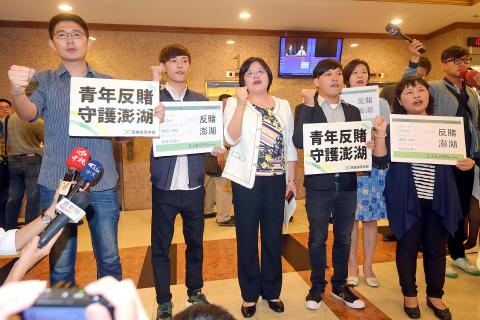Misleading ballot wording could sway the result of Penghu’s referendum tomorrow on legalizing casinos, anti-gambling advocates told a news conference at the Legislative Yuan in Taipei yesterday, promising to pursue legal action to nullify the results if the referendum passes.
Posing with their arms crossed in the shape of an “X” to symbolize a “no” vote in the referendum, environmental advocates and Democratic Progressive Party (DPP) legislators said they were concerned that the “shortened title” of the referendum — “Do you agree to establishing special tourism zones?” — would confuse voters.
The group said they were surprised when they saw the ballot for the first time on Wednesday, with the title listed directly above the box where voting stamps are placed, while the word “casino” is only mentioned in the full referendum question further down the page.

Photo: Huang Yao-cheng, Taipei Times
Previous referendums on Penghu and Matsu were simply titled a “referendum on gambling.”
“Agreeing to establishing ‘special tourism zones’ and ‘casinos’ are two fundamentally different things,” DPP Legislator Wu Yu-chin (吳玉琴) said.
The local election commission should have rejected the title under the Referendum Act (公民投票法), which bans content that might cause voters to misunderstand the plebiscite’s purpose, Wu said.
“This referendum would not be taking place if it were not for plans to set up casinos — that is the entire purpose of the referendum authorized under the Offshore Islands Development Act (離島建設條例). Those who proposed holding a referendum do not have a right to formulate it in a way that is misleading,” Wu added.
Penghu’s election commission on Wednesday said it had no authority to ask the groups who initiated the referendum to change the wording.
Wu said anti-gambling advocates would file a lawsuit to nullify the referendum if it passes, based on provisions of the Referendum Act, which allows for nullification in the event of illegal behavior by the local election commission or others that is sufficient to influence referendum results.
The news conference was followed immediately by a separate press conference, which saw DPP officials and legislators stand with young Penghu residents to urge young voters to return home to vote against legalizing gambling.
DPP Legislator Yang Yao (楊曜) of Penghu was notably absent, with Wu stating he had not been invited to avoid “putting him in a tough spot.”
Penghu County Commissioner Chen Kuang-fu (陳光復) of the DPP, who has said he would maintain a neutral stance throughout the referendum process, drew criticism yesterday from some DPP legislators.
“Chen Kuang-fu has been extremely irresponsible, because he was the one who prodded a hornet’s nest, only to demand that the party central clean up the mess,” DPP Legislator Chen Man-li (陳曼麗) said, attributing the holding of the referendum to the commissioner’s “inexperience” and passivity.
Voting is to take place tomorrow and can pass by a simple majority regardless of turnout under special provisions of the Offshore Islands Development Act.
President Tsai Ing-wen (蔡英文), who is also the DPP chairperson, on Wednesday reiterated the party’s opposition to the opening of casinos in Penghu County.
DPP spokesman Wang Min-sheng (王閔生) quoted Tsai as telling a DPP Central Standing Committee meeting that the party’s position has not changed, and that Penghu should focus on developing tourism rather than rely on gambling for local development.
Additional Reporting by CNA

Alain Robert, known as the "French Spider-Man," praised Alex Honnold as exceptionally well-prepared after the US climber completed a free solo ascent of Taipei 101 yesterday. Robert said Honnold's ascent of the 508m-tall skyscraper in just more than one-and-a-half hours without using safety ropes or equipment was a remarkable achievement. "This is my life," he said in an interview conducted in French, adding that he liked the feeling of being "on the edge of danger." The 63-year-old Frenchman climbed Taipei 101 using ropes in December 2004, taking about four hours to reach the top. On a one-to-10 scale of difficulty, Robert said Taipei 101

A preclearance service to facilitate entry for people traveling to select airports in Japan would be available from Thursday next week to Feb. 25 at Taiwan Taoyuan International Airport, Taoyuan International Airport Corp (TIAC) said on Tuesday. The service was first made available to Taiwanese travelers throughout the winter vacation of 2024 and during the Lunar New Year holiday. In addition to flights to the Japanese cities of Hakodate, Asahikawa, Akita, Sendai, Niigata, Okayama, Takamatsu, Kumamoto and Kagoshima, the service would be available to travelers to Kobe and Oita. The service can be accessed by passengers of 15 flight routes operated by

Taiwanese and US defense groups are collaborating to introduce deployable, semi-autonomous manufacturing systems for drones and components in a boost to the nation’s supply chain resilience. Taiwan’s G-Tech Optroelectronics Corp subsidiary GTOC and the US’ Aerkomm Inc on Friday announced an agreement with fellow US-based Firestorm Lab to adopt the latter’s xCell, a technology featuring 3D printers fitted in 6.1m container units. The systems enable aerial platforms and parts to be produced in high volumes from dispersed nodes capable of rapid redeployment, to minimize the risk of enemy strikes and to meet field requirements, they said. Firestorm chief technology officer Ian Muceus said

MORE FALL: An investigation into one of Xi’s key cronies, part of a broader ‘anti-corruption’ drive, indicates that he might have a deep distrust in the military, an expert said China’s latest military purge underscores systemic risks in its shift from collective leadership to sole rule under Chinese President Xi Jinping (習近平), and could disrupt its chain of command and military capabilities, a national security official said yesterday. If decisionmaking within the Chinese Communist Party has become “irrational” under one-man rule, the Taiwan Strait and the regional situation must be approached with extreme caution, given unforeseen risks, they added. The anonymous official made the remarks as China’s Central Military Commission Vice Chairman Zhang Youxia (張又俠) and Joint Staff Department Chief of Staff Liu Zhenli (劉振立) were reportedly being investigated for suspected “serious